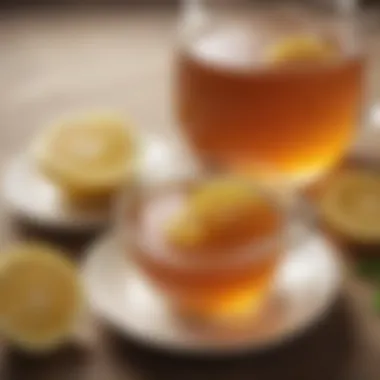Herbal Teas for Soothing Sore Throat Relief


Intro
Sore throats are a common ailment that can disrupt daily life. Herbal teas provide a natural and comforting way to alleviate this discomfort. Instead of reaching for over-the-counter medications, many individuals turn to herbal remedies. These teas offer soothing properties and can be quite effective in easing inflammation and irritation. Understanding the most beneficial herbal teas for sore throat relief is essential for both health-conscious individuals and those seeking better remedies. This guide explores various herbal options, their unique benefits, and preparation methods.
Recipe Overview
Herbal Tea Blends for Relief
Herbal teas designed for sore throat relief combine several soothing herbs, each bringing its benefits. The blends often include chamomile, licorice root, and slippery elm. These ingredients help to reduce irritation and provide comfort. Each blend can be enjoyed warm, creating a calming experience that not only soothes the throat but also promotes overall well-being.
Ingredients List
Main Ingredients
- Chamomile: Known for its anti-inflammatory properties, chamomile can help reduce throat swelling.
- Licorice Root: This herb has natural demulcent qualities, which means it can coat the throat, providing relief from dryness and pain.
- Slippery Elm: Rich in mucilage, slippery elm can soothe irritation and support throat health.
Optional Ingredients
- Honey: A natural sweetener and antimicrobial agent that enhances the taste of herbal tea.
- Ginger: Provides warming properties and can help boost the immune system.
- Lemon: Adds vitamin C and can further enhance the soothing effects by cutting through mucus.
Brewing Methods
To prepare these herbal teas, start by boiling water. Add the herbal ingredients of choice in a teapot or infuser. Steep for about 10-15 minutes to allow the flavors and benefits to infuse properly. Sweeten with honey, lemon, or other optional ingredients to taste. Drink while warm for the best effect.
Prologue to Herbal Teas and Sore Throats
The discomfort caused by sore throats is a common health issue, affecting millions of people each year. It can stem from various causes, including viral infections, allergies, or environmental factors. Each person experiences this condition uniquely. This section explores how herbal teas have been traditionally used to alleviate throat pain effectively. The soothing properties of these teas not only provide temporary relief but also contribute to overall well-being.
Defining Sore Throat
A sore throat typically presents as irritation, scratchiness, or pain in the throat. This discomfort can be worsened by swallowing, speaking, or coughing. In most cases, it resolves on its own, but it can also be a signal of an underlying condition, such as a cold or strep throat. Recognizing the symptoms early can help guide treatment options. The term "sore throat" encompasses a range of medical terms like pharyngitis or laryngitis, which can describe the inflammation of different throat parts.
Symptoms may include:
- Dryness
- Swelling
- Painful swallowing
- Red or swollen tonsils
Understanding these symptoms can direct individuals to seek proper remedies, including herbal teas that may ease their discomfort.
Role of Herbal Teas in Traditional Remedies
Herbal teas have roots in traditional medicine practices across cultures. They are often chosen for their natural ingredients, which are believed to support health without the side effects commonly associated with pharmaceutical solutions. Many herbal remedies offer anti-inflammatory and soothing properties. By utilizing herbs like chamomile and ginger, these infusions can help in minimizing throat irritation.
Traditional practices have long recognized the value of temperature, flavor, and aroma in herbal teas. The warmth of tea provides comfort, while herbal components often carry compounds that can relieve symptoms at multiple levels. Certain teas may also foster relaxation, reducing stress that can exacerbate discomfort.
"Herbal teas serve as a bridge between ancient wisdom and modern wellness, offering holistic relief for common ailments such as sore throats,"
By integrating knowledge of herbal teas into daily life, individuals can create a natural toolkit for throat relief, enhancing their approach to health management.
Understanding Herbal Components
Understanding the herbal components in teas is essential for appreciating their therapeutic effects, particularly for sore throat relief. Many herbal teas contain unique compounds that contribute to their soothing and healing properties. These compounds can help alleviate discomfort and promote overall wellness.


Herbal teas like chamomile, peppermint, and ginger have been used for centuries in various cultures. Their active ingredients can provide a variety of benefits that target issues like inflammation and infections. Knowing how these components work is key to selecting the right tea for sore throat relief.
Active Compounds in Herbal Teas
Active compounds found in herbal teas are responsible for their health benefits. For instance, flavonoids are common in many herbs and have antioxidant properties. These compounds help reduce oxidative stress in the body, which can be beneficial when dealing with any type of inflammation, including a sore throat.
Moreover, tannins, which are present in teas like chamomile and peppermint, have astringent effects, helping to tighten and soothe tissues in the throat. This makes them particularly effective in reducing discomfort and irritation. In summary, the active compounds in herbal teas play a crucial role in their effectiveness for sore throat relief.
Mechanism of Action for Sore Throat Relief
Understanding how herbal teas alleviate sore throat symptoms involves examining their mechanisms of action. Two primary actions are particularly notable: anti-inflammatory and antimicrobial effects.
Anti-inflammatory Properties
Anti-inflammatory properties are significant when considering herbs for soothing sore throats. Many herbs contain compounds such as flavonoids and essential oils that naturally reduce inflammation. For example, chamomile tea is rich in chamazulene, which is known for its anti-inflammatory effects. This characteristic makes chamomile a popular choice in soothing throat discomfort.
The unique feature of these anti-inflammatory properties is that they can modulate the body's immune response. This means that they may help calm an overactive response to allergens or infection that might cause throat swelling. However, a potential drawback is that while they are effective, they might not provide immediate relief. Instead, they work over time to reduce overall inflammation in the body.
Antimicrobial Effects
Antimicrobial effects are another key aspect of herbal teas that contribute to their effectiveness against sore throats. Many herbal constituents can inhibit the growth of bacteria and viruses. For instance, peppermint tea has been shown to have antimicrobial qualities, helping in fighting infections that can cause throat irritation.
The notable characteristic of these antimicrobial effects is their potential to support the body’s fight against pathogens responsible for throat inflammation. While effective, it's essential to recognize that not all herbal teas have the same strength in this area. Some may provide mild relief, while others offer a more robust capacity to combat infections.
Top Herbal Teas for Sore Throat Relief
Herbal teas have been a cornerstone of natural remedies for generations. They are not just beverages; they can provide significant relief from various ailments, including sore throats. Understanding the specific herbal options available for this issue is crucial. This section will discuss several herbal teas that stand out in their effectiveness for alleviating sore throat discomfort.
Chamomile Tea
Benefits and Effects
Chamomile tea is acclaimed for its anti-inflammatory and soothing properties. It has a calming effect, which can be beneficial at times when discomfort is heightened. Its unique feature is the presence of antioxidants that help in reducing swelling in the throat. The flavonoids in chamomile also offer antimicrobial benefits. These properties make chamomile a popular choice for sore throat relief, as the warm beverage can coat the throat, easing irritation.
Preparation Tips
To maximize the benefits of chamomile tea, steep one tea bag or a few teaspoons of dried chamomile flowers in hot water for about 5 to 10 minutes. Straining the tea can help eliminate any leftover particles. This method ensures that the essential oils and nutrients are fully extracted. You may add honey if desired, although it is optional, as chamomile has a naturally pleasant taste.
Peppermint Tea
Benefits and Effects
Peppermint tea is another effective option for sore throat relief. The menthol found in peppermint acts as a natural anesthetic that can numb the throat and relieve pain. This tea is particularly helpful in terms of opening up airways. The cooling effect provides comfort to an irritated throat. However, it is essential to note that excessive consumption of peppermint may lead to digestive discomfort for some individuals.
Preparation Tips
For making peppermint tea, use fresh peppermint leaves if possible, as the flavor is more vibrant. Steep about 10 fresh leaves or a mint tea bag in hot water for five minutes. Keeping the infusion time brief helps in capturing the fresh taste without overwhelming the palate. Adding lemon can enhance the flavor, making it more enjoyable, though not necessary for its effectiveness.
Ginger Tea
Benefits and Effects
Ginger tea deserves attention due to its powerful anti-inflammatory properties. Ginger helps to soothe the throat and reduce swelling. The specific compounds in ginger, like gingerol, provide antioxidant benefits, which may contribute to general respiratory health. An advantage to consider is its ability to boost the immune system, making it a formidable ally during cold seasons.


Preparation Tips
Fresh ginger works best for an impactful brew. Prepare ginger tea by slicing a small piece of ginger and boiling it in water for about 10 minutes. Strain and enjoy this robust beverage. You may also add honey or lemon for added flavor, but the pure ginger infusion can stand strong alone. It is generally good practice to consume ginger tea in moderation to avoid stomach discomfort.
Licorice Root Tea
Benefits and Effects
Licorice root tea is known for its soothing properties. It can provide relief by acting as a demulcent, which means it forms a protective layer over the throat. This tea contains glycyrrhizin, an active compound that has anti-inflammatory effects. However, it is worth noting that licorice can have high blood pressure effects if consumed in excessive amounts, so caution is necessary.
Preparation Tips
To prepare licorice root tea, you can use either dried root or tea bags. A general guideline is to steep one teaspoon of dried root in hot water for 10 minutes. Strain before drinking to remove any residuals. This tea may have a strong flavor, so it can be beneficial for those who appreciate herbal taste without adding sweeteners.
Throat Coat Tea
Benefits and Effects
Throat Coat tea is specifically formulated to provide relief for throat irritation. It usually contains a blend of slippery elm, licorice root, and marshmallow root, all known for their throat-soothing effects. The blend's unique value is how it creates a protective layer in the throat, easing discomfort and promoting healing. This makes it particularly effective for individuals who speak or sing frequently.
Preparation Tips
Brewing Throat Coat tea is simple and should follow the instructions on the package. Generally, using hot water, steep the blend for at least 5 to 10 minutes. This will allow the constituents to dissolve fully and enhance the tea's effectiveness. Consider taking this tea during periods of distress for optimal results.
Brewing Techniques for Optimal Efficacy
Brewing techniques are critical when it comes to extracting the maximum benefits from herbal teas, particularly for sore throat relief. The right brewing methods ensure that the active compounds within the herbs are optimally dissolved, allowing for effective therapeutic effects. Different factors, such as water quality, temperature, and infusion time can greatly influence how well the beneficial properties are released. Understanding these elements aids in crafting a tea that can not only taste good but also deliver the desired relief.
Water Quality and Temperature
The quality of water used in brewing herbal teas can significantly affect the flavor and efficacy of the tea. For herbal teas aimed at soothing a sore throat, it is advisable to use filtered or bottled water. Tap water may carry impurities that can alter the taste and potentially lessen the health benefits.
Temperature is another essential factor to consider. Most herbal teas require water that has reached a temperature between 190°F and 212°F (88°C to 100°C). Boiling water helps extract tannins, flavonoids, and other phytochemicals effectively. However, be cautious. Boiling water may damage delicate herbs. In such cases, letting the water cool for a minute after boiling can be beneficial.
Tip: Start boiling your water and allow it to cool slightly for certain delicate herbs like chamomile which prefer slightly lower temperatures.
Time of Infusion
Timing is equally vital for achieving optimal potency in herbal teas. Each type of herb requires a specific infusion time to reach its full potential. Generally, steeping herbal teas for about 5 to 10 minutes is recommended. If you infuse them for too short of a time, you may not tap into their full healing abilities. Conversely, steeping for too long can result in bitterness, particularly with stronger flavors like peppermint or ginger.
A good practice is to begin with a standard infusion time and then adjust according to your taste preference and the characteristics of the herb.
Recommended Infusion Times for Various Herbs:
- Chamomile: 5 to 10 minutes
- Peppermint: 5 to 7 minutes
- Ginger: 8 to 10 minutes
By paying attention to these brewing techniques, you can enhance the effectiveness of herbal teas, ultimately contributing to better throat comfort.
Incorporating Herbal Teas into Daily Routine
Incorporating herbal teas into a daily routine offers numerous benefits, particularly for those seeking relief from sore throats. Regular consumption can provide ongoing support for the immune system and soothe irritated throats. Understanding the best practices for integrating these teas into daily life is essential. This section delves into the frequency of consumption and the potential interactions that herbal teas may have with other remedies.


Frequency of Consumption
The effectiveness of herbal teas in alleviating sore throat symptoms depends significantly on their frequency of use. To achieve optimum results, consider the following points:
- Daily Consumption: Drinking herbal tea daily can help maintain a soothing effect on the throat. It can also contribute to overall hydration, which is essential for health.
- Timing Matters: Consuming herbal tea during peaks of throat discomfort can be particularly beneficial. When feeling the onset of soreness, increase the frequency to every few hours till the symptoms improve.
- Rest and Relaxation: While drinking tea, take a moment to rest. Sipping slowly not only enhances the experience but helps with absorption of beneficial compounds.
The goal is to make herbal teas a part of your daily health regimen without overwhelming the body. It is advisable to listen to your body and adjust the frequency based on how you feel.
Potential Interactions with Other Remedies
Herbal teas can sometimes interact with other over-the-counter or prescription medications. It is vital to consider the following aspects:
- Consultation with Healthcare Providers: Before starting any new herbal tea, check with a healthcare professional. Certain herbs may alter the effectiveness of medications.
- Caution with Herbal Combinations: Mixing multiple herbal teas may cause unpredictable reactions. Use caution when combining teas like ginger and licorice root, for instance, as both can have strong effects.
- Monitor for Adverse Effects: Pay close attention to how the body reacts, especially when introducing new teas. If experiencing any discomfort, discontinue use and seek advice.
Herbal teas can complement traditional remedies, but understanding potential interactions is key to safe consumption.
In summary, incorporating herbal teas into one's daily routine is not just a health trend; it can be a vital practice for those managing sore throats. By setting a suitable frequency and being aware of interactions with other remedies, individuals can maximize the benefits that herbal teas provide. This thoughtful integration can enhance well-being, making herbal teas an ally in throat health.
Precautions and Considerations
When it comes to the use of herbal teas for sore throat relief, understanding precautions and considerations is crucial. This ensures that consumers make informed choices in their approach to natural remedies. The use of herbal ingredients offers benefits but also comes with possible risks. Knowing these factors can help in maximizing the effectiveness of herbal teas while minimizing adverse effects.
Allergies and Reactions
Herbal teas can cause allergic reactions in a small number of people. Common allergens include chamomile, peppermint, and ginger. If someone has a known history of allergies to plants within these families, they should exercise caution. The reaction may manifest in various forms, including skin rashes, respiratory issues, or gastrointestinal distress. In cases where someone experiences an adverse reaction after consuming a specific tea, it is advisable to discontinue use immediately. Reading the ingredient label on commercial tea blends can help to avoid unexpected allergens.
Tips to Avoid Allergic Reactions:
- Identify any pre-existing allergies.
- Start with small amounts of any new herbal tea.
- Monitor your body's response closely.
For some, the pleasant taste of herbal tea may distract from its potential risks. It is advisable to remain mindful and practice moderation. Bringing awareness to how one feels after consumption can guide better future choices. Those with severe allergies should consider seeking alternatives that pose a lesser risk.
Consulting Healthcare Professionals
Before integrating new herbal teas into one's routine, it is advisable to consult healthcare professionals. This is particularly important for individuals currently taking medications or who have pre-existing health conditions. Herbal components may interact with prescription drugs, altering their effects. For instance, ginger tea may amplify the effects of anticoagulant medications, potentially leading to complications.
Moreover, healthcare professionals can provide tailored advice regarding suitable herbal teas based on individual health profiles. They may recommend specific ingredients or brewing practices that align with one's health needs. Additionally, medical guidance is essential for pregnant or breastfeeding individuals, as some herbs can carry risks during these stages.
Questions to Discuss with Healthcare Providers:
- Are there any specific herbal teas you recommend for sore throat relief?
- Can herbal teas interact with any of the medications I am taking?
- What dosage or frequency of consumption is considered safe for my condition?
In summary, while herbal teas are a comforting and potentially therapeutic choice for sore throats, they are not without limitations. It is essential to remain informed about possible allergic reactions and actively seek guidance from healthcare professionals. This forms a foundation for safe and beneficial use of herbal teas.
Epilogue
The conclusion of this article serves to illuminate the primary insights regarding herbal teas and their efficacy in providing relief from sore throats. The importance of herbal teas in treating throat discomfort cannot be understated. Their historical and contemporary use across cultures highlights their value in natural remedies. As explored throughout the article, various herbal teas not only soothe inflammation but also deliver essential nutrients that support the immune system. This compounds their benefits significantly.
Summary of Key Takeaways
To summarize key takeaways from our exploration:
- Diverse Selection: Herbal teas like chamomile, peppermint, ginger, licorice root, and throat coat tea offer unique benefits. Each brings distinct active compounds that can alleviate sore throat symptoms.
- Brewing Techniques Matter: Optimal brewing methods enhance the effectiveness of these teas. Using quality water and adhering to recommended steeping times can make a significant difference in the healing potential of the tea.
- Daily Incorporation: Integrating these herbal beverages into daily routines not only helps in immediate relief but also contributes to long-term throat health. Regular consumption can fortify the body’s defenses.
- Precautions and Professional Advice: Understanding potential allergies and consulting healthcare professionals when necessary ensures safe consumption. This is important for those with pre-existing conditions or those taking medication that might interact with herbal ingredients.
Final Thoughts on Herbal Teas
Lastly, it's imperative to acknowledge herbal teas as more than mere remedies. They encapsulate a blend of tradition, natural healing, and personal preference. Their versatility makes them accessible to everyone from casual drinkers to herbal enthusiasts. The simple act of brewing a cup can be both a comforting ritual and a therapeutic experience across demographics.
In seeking alternative avenues for sore throat relief, herbal teas consistently present compelling advantages. As research advances and more consumers lean toward natural remedies, herbal teas remind us of the intersection between nature and wellness. With informed choices, anyone can navigate this path to better health effectively.







